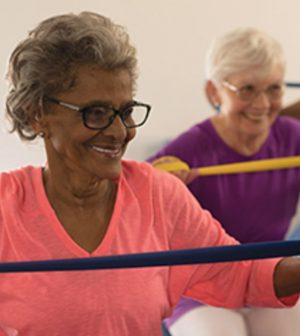- The Best Time of Day to Drink Bone Broth to Maximize Health Benefits
- 8 Ways to Increase Dopamine Naturally
- 7 Best Breads for Maintaining Stable Blood Sugar
- Gelatin vs. Collagen: Which is Best for Skin, Nails, and Joints?
- The Long-Term Effects of Daily Turmeric Supplements on Liver Health
- Could Your Grocery Store Meat Be Causing Recurring UTIs?
- Are You Making This Expensive Thermostat Error This Winter?
- Recognizing the Signs of Hypothyroidism
- 10 Strategies to Overcome Insomnia
- Could Artificial Sweeteners Be Aging the Brain Faster?
Even Low-Intensity Exercise Can Help During Cancer Treatments

If you have cancer and you’re trying to exercise to boost your health, new research suggests you don’t have to knock yourself out during your workout.
Light exercise is just as beneficial as more demanding workouts for cancer patients, the researchers found.
Previous research has shown that physical activity can improve cancer patients’ physical and mental health, reduce fatigue and ease the side effects of treatment. But it wasn’t clear whether exercise intensity made a difference.
To find out, researchers studied 577 people, aged 30 to 84, in Sweden who were recently diagnosed with breast, prostate or colorectal cancer. The patients were randomly selected to do resistance and endurance exercise at either high or low-to-moderate intensity.
The resistance training was provided in instructor-led groups at a large fitness club, while the endurance training was done at home.
After six months, the high-intensity group had somewhat less physical fatigue, better leg muscle strength, and slightly better fitness than the low-to-moderate intensity group, the findings showed.
However, overall results in the two groups were similar, according to the study published online recently in the journal Scandinavian Journal of Medicine and Science in Sports.
“The conclusions we draw from the study are, first, that whether the training is of high or low-to-medium intensity doesn’t seem to matter much. The groups’ results didn’t differ in a clinically relevant way — that is, there was no difference likely to make a difference in the patients’ everyday life,” Ingrid Demmelmaier, an associate professor of physiotherapy at Uppsala University, said in a school news release.
The researchers will continue to follow the patients to assess the long-term effects of exercise on their health.
This study also assessed whether extra support such as goal-setting, planning and self-monitoring of exercise improved patients’ results from working out.
But that additional support appeared to have no effect, perhaps because the exercise programs already included significant support, including training instructions, a heart-rate monitor, and instructor-led group training with other participants in a similar situation, the researchers said.
More information
The American Cancer Society has more on cancer patients and exercise.
SOURCE: Uppsala University, news release, Feb. 3, 2021
Source: HealthDay
Copyright © 2026 HealthDay. All rights reserved.










